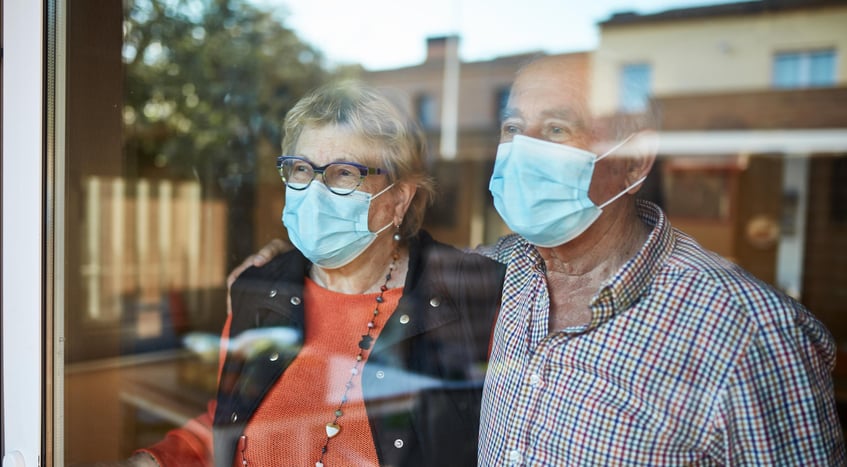The news these days is terrifying. As the coronavirus spreads, none of us—not celebrities, politicians, or even princes—are safe. If you have a loved one living with dementia in a facility, the reports are even more disturbing. According to the New York Times, over 40% of COVID-19 deaths in the United States are linked to nursing homes and other long-term care facilities for older adults.

That figure is dire for several reasons. COVID-19 is particularly lethal in people over 65 with underlying health conditions. It can also spread like wildfire through care facilities, where people tend to be confined and there’s frequent contact with staff (who may work in multiple facilities). And when those facilities include people living with dementia, there’s the added complication of residents forgetting to wash hands, wear masks, or remain socially distant.
So, what can you do to help your loved one stay safe in a facility? Here are some ideas.
STAY HEALTHY:
• If you’re the primary contact for someone in a facility, consider yourself a first responder. You need to stay healthy in order to advocate for your loved one. Follow these proven precautions:
-Wear a mask.
-Wash your hands often.
-Cover coughs and sneezes.
-Avoid touching your eyes, nose, and mouth.
-Stay six feet apart from people outside your household.
-Disinfect high-traffic surfaces often (especially door handles, light switches, and remote controls).
• Encourage your loved one to follow these measures as well. If they can’t remember, ask the facility to post reminders.
• In case you do get sick, appoint a backup contact the facility can approach with questions or emergencies.
• If you have any symptoms, do not visit the facility—stay home and contact your healthcare provider.
STAY INVOLVED:
• Long-term care facilities can be short staffed, especially during a crisis. Protect your loved one by knowing the symptoms of COVID-19 and raising the alarm if necessary.
• Recognize an important sign of COVID-19 in people living with dementia: increased confusion. It can be hard to tell what’s normal and what’s elevated, so alert staff if there’s any doubt.
• The AARP compiled these questions to ask facilities. If the answers concern you, consider another option. For example, our new live-in care service includes strict hygiene protocols and reduced shifts to limit exposure.
STAY CONNECTED:
• Since every visitor opens myriad vectors for contagion, many facilities have rightfully closed their doors during the pandemic. Unfortunately, isolation can have serious health repercussions as well. Your absence, the change in the routine, the inability to understand what’s happening—it can all increase stress for your loved one. So, do what you can to stay in touch. Write letters, call, video chat, gather outside the facility, or even visit through glass.
• Make the most of technology by enjoying a virtual meal or movie together.
• Technology can also connect residents to the broader world. Museums, dance companies, theaters, zoos—many organizations offer live streaming and performances that can reduce isolation and stress for your loved one (and you!).
It’s hard to be separated during a pandemic. Doing what you can to stay healthy, involved, and connected will help your loved one stay safe as well. For more information on COVID-19 in care facilities, visit AARP, the Alzheimer’s Association, and UCSF’s Memory and Aging Center.
Written by Admin
Author bio